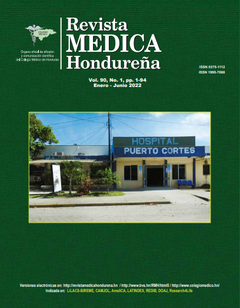Use of monoclonal antibodies in adults with COVID-19 in a public hospital of Honduras
DOI:
https://doi.org/10.5377/rmh.v90i1.14361Keywords:
COVID-19, Cytokine Realese Syndrome, Monoclonal AntibodiesAbstract
Background: The COVID-19 pandemic has triggered a global public health crisis, creating uncertainty about its treatment. Tocilizumab (TCZ), a humanized monoclonal antibody that acts as an antagonist of the Interleukin 6 receptor (IL-6), has been used in immunological diseases and for the treatment of critically ill patients due to COVID-19. Objective: To describe the use of TCZ in adult hospitalized COVID-19 patients at Hospital María Especialidades Pediátricas (HMEP), August 2020- March 2021. Methods: Descriptive, retrospective study. The data source was the medical records. Inclusion criteria: Adults over 18 years old, hospitalized with COVID-19, treated with TCZ and complete medical record. Exclusion criteria: Patients who received TCZ in another hospital. Descriptive statistics was used; Kaplan & Meier survival analysis were used to compare the probability of survival to age, with a significance level p<0.05. Results: 104 medical records were analized. The median age of patients was 57 years (IR=44-67), the age was higher in the deceased; 60% (62/104) of the patients were male. The patients showed improvement in clinical and laboratory parameters such as decreases in respiratory rate and heart rate, an increase in lymphocytes and a decrease in C-reactive Protein (CRP). In The Kaplan & Meier analysis showed that the probability of living decreases with increasing age. Discussion: The results of this study agree with those found in international reports, supporting the use of TCZ in critical patients due to COVID-19.
Downloads
506
Downloads
Published
How to Cite
Issue
Section
License
Copyright (c) 2022 EL AUTOR

This work is licensed under a Creative Commons Attribution 4.0 International License.




